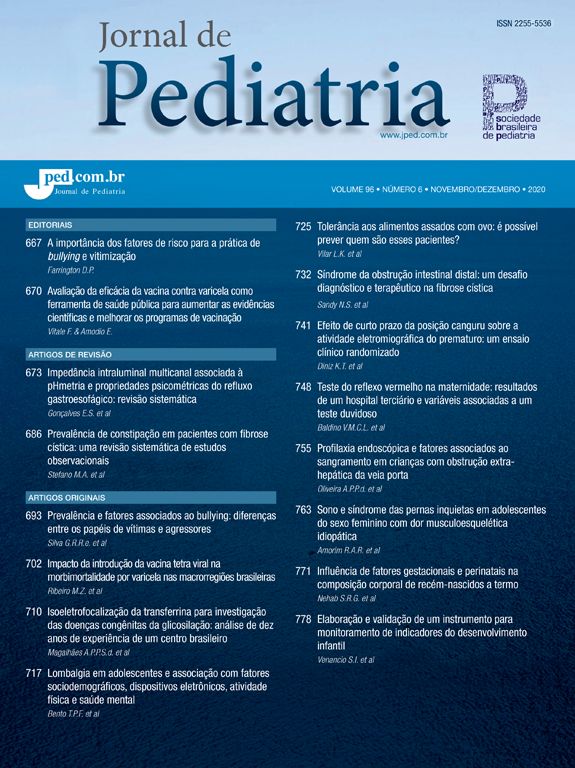To assess treatment withdrawal in children and adolescents with autoimmune hepatitis, with clinical and laboratory remission for a minimum period of 24 months, determining the relapse rate after treatment withdrawal.
MethodsThis is a descriptive, retrospective and partially prospective study of 21 children and adolescents with type 1 autoimmune hepatitis treated at the Outpatient Division of Pediatric Hepatology, Teaching Hospital of Universidade Federal de Minas Gerais (UFMG), Belo Horizonte, Brazil, between January 1986 and December 2001.
ResultsWe assessed 54 patients and selected 21, of whom 19 were female subjects (90.5%), aged between 5.7 and 17.6 years (median = 13.8 years), with a mean follow-up of 5.1±2.4 years (median = 4.4 years) and an average clinical and laboratory remission of 4.1±1.5 years (median = 4.1 years). Out of the 21 patients studied, 10 (47.6%) manifested some inflammatory activity that prevented the discontinuation of treatment, which was withdrawn in 11 patients (52.4%). Out of these, six patients (54.5%) presented reactivation of the disease and five maintained clinical and laboratory remission with a mean follow-up of 4±1 years (median = 3.9 years). The time interval between discontinuation of treatment and reactivation of the disease ranged from 29 days to 40.3 months (median = 2.2 months).
ConclusionsWe observed a high relapse rate (54.5%) in this group of patients with autoimmune hepatitis, which was more frequent within the first 12 months after treatment withdrawal, in addition to a high number of patients that presented some degree of inflammatory activity despite the long period of clinical and laboratory remission.
Avaliar a suspensão do tratamento em crianças e adolescentes com hepatite auto-imune em remissão clínica e laboratorial, por um período mínimo de 24 meses, avaliando o índice de recaída após a suspensão do tratamento.
MétodoÉ um estudo descritivo, retrospectivo e parcialmente prospectivo de 21 crianças e adolescentes com hepatite auto-imune tipo 1, atendidos no Ambulatório de Hepatologia Pediátrica do Hospital das Clínicas da Universidade Federal de Minas Gerais (UFMG), no período de janeiro de 1986 a dezembro de 2001.
ResultadosForam avaliados 54 pacientes, dos quais 21 foram selecionados, sendo 19 do sexo feminino (90,5%), com idade variando de 5,7 a 17,6 anos (mediana de 13,8 anos), tempo médio de seguimento de 5,1±2,4 anos (mediana 4,4 anos) e remissão clínica e laboratorial por um tempo médio de 4,1±1,5 anos (mediana 3,8 anos). Dos 21 pacientes avaliados, 10 (47,6%) ainda apresentavam atividade inflamatória, impossibilitando a suspensão do tratamento, o qual foi interrompido em 11 pacientes (52,4%). Desses, seis pacientes (54,5%) apresentaram reativação da doença, e cinco mantêm remissão clínica e laboratorial, com tempo médio de seguimento de 4±1 anos (mediana 3,9 anos). O intervalo de tempo entre a suspensão do tratamento e a reativação da doença variou de 29 dias a 40,3 meses (mediana 2,2 meses).
ConclusõesNesse grupo de pacientes com hepatite auto-imune, foi observado alto índice de recaídas (54,5%), que ocorreram com maior freqüência nos primeiros 12 meses pós-suspensão do tratamento, além de grande número de pacientes que apresentou algum grau de atividade inflamatória, apesar do longo tempo de remissão clínico-laboratorial.








